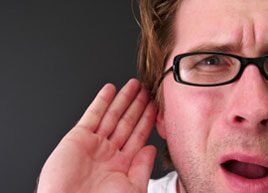The guy’s guide to hearing loss
Concerned that your hearing isn’t quite what it used to be? Here’s what you need to know about hearing loss, and what you can do to minimize your risk

Source: Best Health Magazine, March/April 2011
While genetics, head injury, illnesses and aging can all cause hearing loss, noise damage is the leading culprit. About 23 percent of adults have some hearing loss, and 60 percent of those are men. Why? They tend to have louder hobbies than women (e.g., snowmobiling, using power tools), and often have noisier jobs. "The good news is noise-induced hearing loss is preventable," says Rex Banks, chief audiologist for the Canadian Hearing Society.
When exposed to loud noises, especially for a long time, you lose the sensory cells in your ears that transmit information to the brain. "Once the cells are damaged, you can’t grow them back or restore hearing," says otolaryngologist Alan Micco, president of the American Hearing Research Foundation.
Listening to blaring music when younger can come back to haunt anyone. Indeed, almost one in four Canadians under age 40 report some hearing loss. “One of our biggest worries is increased hearing loss in younger people,” says Prudence Allen, director of the National Centre for Audiology at the University of Western Ontario. “You can suffer a lot of damage before you notice. It’s cumulative, so the damage you do at concerts may be temporary, but it can become permanent.”
The first sign is often the loss of high-frequency hearing, making it harder to hear women’s and children’s voices. If you think a female friend or partner constantly mumbles, or you need to turn up the TV’s volume, you may have some hearing loss. Tinnitus, an intermittent or constant ringing, buzzing or clicking in the ears, is another cause. It affects some 360,000 Canadians.
How to lower your risk of hearing loss
Hearing loss can be minimized by protecting ears from noise and other risk factors. Here are six simple ways to lower your risk of hearing loss:
‘ Cover up. Use earmuffs or earplugs when exposed to loud noises like a lawnmower.
‘ Tune out. Wear "active reduction" earphones designed to cancel out background noise, so that at places like the gym there’s no need to drown it out with a blaring headset.
‘ Butt out. A study in Tobacco Control found smoking and exposure to second-hand smoke increases the risk of hearing loss, possibly by disrupting blood flow to vessels in the ear.
‘ Turn it down. Listening to iPods and the like for five minutes a day at maximum volume may increase the risk. If you can’t hear someone speaking within three feet of you, or the person next to you can hear the Coldplay blasting, lower the volume, says Banks.
‘ Talk to the doc about meds. University of Alabama researchers found that men who used sildenafil citrate (Viagra) for erectile dysfunction were twice as likely to report hearing loss. And a study in the American Journal of Medicine showed men under age 50 were more likely to have hearing loss if they used certain pain relievers regularly.
‘ Get help. If you suspect that you have hearing loss, you can get checked by an audiologist (find one at speechandhearing.ca). Provincial health plans may cover part of the $60 to $95 cost. Also, the look of a hearing aid needn’t be a concern: "Today’s are slick and less obvious than past ones," says Allen.
This article was originally titled "Say what?" in the March/April 2011 issue of Best Health. Subscribe today to get the full Best Health experience’and never miss an issue!’and make sure to check out what’s new in the latest issue of Best Health




